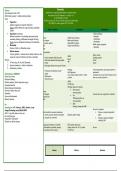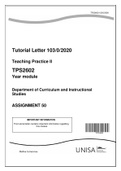Delirium Dementia
Acute confusional state- 30% Syndrome of a progression global decline in cognitive function
Affect elderly people + multiple medical problems Most common in the UK: Alzheimer’s > Vascular > LB
Types Dx AMTS, MMSE (≤ 24/30)
Mx Blood screen sent to rule out reversible causes e.g. hypothyroidism
• Hyperactive FBC, U&Es, LFTs, calcium, glucose, TFTs, B12, folate
Agitated, aggressive, frequently hallucinate
Causes: Alcohol withdrawal, drug intoxication, medication
Types
related Causes Signs + symptoms Investigations Management
• Hypoactive (commonest) 3 Achase inhibitors:
Exact cause unknown Amnesia
Reduced awareness of surroundings, decreased muscle Disorientation - Donepezil
RF: Increased APP-gene load MMSE, bloods, histology
movements, lethargy, indifference and neglect of things - Galantamine
Familial gene association: APP, Presenilin 1 Personality changes Beta-amyloid plaques
Alzheimer’s disease
Causes: hypoxia, metabolic disturbances, ACh medication Apraxia, agnosia, aphasia - Rivastigmine
/ 2, Apolipoprotein E4 Acetylcholine (reduced)
• Mixed-state Hypothyroidism NMDA receptor antagonist:
Aggression Tangles (neurofibrillary)
Features of both - Memantine
FHx in a fluctuating manner Wandering
• Delirium-tremens Stepwise progression
Tremors, agitation + confusion due to alcohol withdrawal,3alsotypes: Dietary advice
caused by concurrent infections and illness in alcoholics MMSE
1. Vascular dementia following stroke Smoking cessation
Vascular
Theories Infarcts to small + medium sized vessels Bloods
2. Multi-infarct dementia following multiple Rx DM
1. NT levels (e.g. DA, NA, Ach, Glutamate) MRI
strokes Aspirin
2. Neuronal membrane + ability to depolarise 3. Binswanger disease (microvascular infarcts)
3. Inflammatory cytokines Triad
Histology Avoid antipsychotics: causes hypersensitivity to
1. Parkinsonian bradykinesia, tremor +
Association w/ Parkinson’s ApOE genotype neuroleptics
Lewyfeatures
Clinical Body ‘DELIRIUM’ rigidity
Avoid antipsychotic drugs in these patients Lewy bodies, ubiquitin proteins + alpha- Levodopa may be used to Rx Parkinson’s Sx but
Onset: Days/weeks 2. Hallucinations
synuclein they may worsen psychotic Sx
Disordered thinking 3. Fluctuating course
Emotions (euphoric, fearful, depressed, angry) MMSE
Language impaired CT/MRI scan
Illusions/delusions/hallucinations Histology depends on subtype:
Amnesia • Microvacuolar
Reversal of sleep-wake cycle Disorientation
Fronto-temporal
Inattention Genetic association w/ chromosome Microvacuolation
Personality changes Currently none: only supportive Rx available
(Pick’s disease)
Unaware/disorientated 17q21- 22 + tau 3 gene mutations
Decreasing self-care • Pick
Memory decrease Disinhibition Widespread gliosis, no
microvacuolation
Mx • MND
Screening tool: 4AT (Alertness, AMT4, Attention, Acute Histology changes like MND
No cure, Rx symptoms:
change/Fluctuating course)/MoCA/AMTS
A complication of Huntington’s disease
AMT4 = Age, DoB, place, currentgene
yearon Ch4 Uncontrolled choreiform movements, depression, • Chorea: an atypical antipsychotic
Defective
Huntington’s
Rx underlying cause Causes uncontrollable choreiform irritability, anxiety, psychosis, obsessive-compulsive Diagnostic genetic testing agent
behaviour, saccadic eye movements • Obsessive-compulsive thoughts +
Haloperidol/ Olanzapine movements + dementia
Thiamine for delirium tremens irritability: SSRI
Rapidly progressive dementia (4-5 months) ECG: triphasic spikes seen
Creutzfeldt-Jakob Caused by prions
Amnesia, disorientation, personality changes, Lumbar puncture for 14-3-3 protein No cure
disease (CJD) Progressive + no cure
depression, psychosis, ataxia, seizures CT/MRI scan
Features Delirium Dementia





